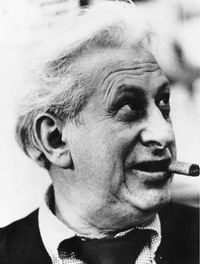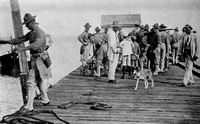|
|
Seeds of Fire: A People’s Chronology
Recalling events that happened on this day in history.
Memories of struggle, resistance and persistence.
Compiled by Ulli Diemer
|
May 16, 1912
|

|
|
Birth of Studs Terkel (1912-2008), radical author, broadcaster, actor, historian.
Quote: “Work is about a search for daily meaning as well as daily bread, for recognition as well as cash, for astonishment rather than torpor; in short, for a sort of life rather than a Monday through Friday sort of dying.”
|
|
May 16, 1916
|

|
|
The U.S. invades and takes control of the Dominican Republic. The occupation continues until the end of 1924, when U.S. forces withdraw after installing a compliant government which signs a treaty giving the United States control of the country’s customs revenues.
|
|
May 16, 1934
|

|
|
Teamsters (truck drivers) in Minneapolis go on strike and shut down nearly all commercial transport. The only exception are farmers, who are permitted to come in on their own trucks and deliver directly to grocers, but not to the warehouse district. Violence breaks out on May 19 when police and so-called ‘deputies’ (thugs hired by the companies) attack strikers. On May 22, an all-out battle starts when police and private deputies try to break the picket lines. Police and deputies are forced to retreat; two deputies are killed.
On May 25, employers and the union reach an agreement that provides for union recognition, reinstatement for all strikers, seniority and a no-discrimination clause. The agreement lasts less than two months: on July 17, employers announce that they going to renege on the agreement. The strike resumes.
On July 20, police open fire on strikers with shotguns, killing two and injuring sixty-seven. A public commission, set up later by the governor, finds that “Police took direct aim at the pickets and fired to kill. Physical safety of the police was at no time endangered. No weapons were in possession of the pickets.”
In August, a federal mediator brings about a new agreement, which includes union recognition and acceptance of the union’s major demands.In the aftermath, thousands of workers in other industries in Minneapolis unionize.
|
|
May 16, 1950
|
|
|
Workers in Nairobi go on a general strike. The strike paralyzes the city and spreads to other cities in Kenya. The British colonial authoritities respond by imprisoning hundreds of workers.
|
|
May 16 - June 25, 1954
|
|
|
After the guards in the Soviet prison labour camp at Kengir murder several prisoners, their comrades rebel and take control of the camp compound, forcing all guards to leave. Political prisoners and criminals at the camp join together in a common effort and elect their own government.
During the time they control the gulag, they produce art, poetry, songs, and political propaganda.
After 40 days, the revolt is crushed by the military; several hundred prisoners are killed.
A song written during the rebellion:
We will not, we will not be slaves
We will not, we will not carry the yoke any longer.
|
|
May 16, 1966
|
|
|
The Politburo of the Chinese Communist Party, taking its lead from Mao Zedong, announces the launch of a “Great Cultural Revolution.” Politburo documents claim that counter-revolutionary revisionist elements have sneaked into the Party, the government, the army, and various spheres of culture and education. A number of senior party leaders are dismissed.
Mao’s goal is to shake up the party and purge the political rivals who challenged his pre-eminent position in the party after the disastrous failure of Mao’s “Great Leap Forward.”
“Revisionism” is Mao’s word for the developments that took place in the Soviet Union after the death of Stalin. Mao sees Stalin as a great leader whose legacy was undermined by those who took over after his death.
Events in China move quickly, with mass rallies in support of Mao. Classes are cancelled throughout the country after a big-character poster endorsed by Mao claims that educational administrations have been infiltrated by revisionists. Soon the streets are filled with student “Red Guards” demonstrating in support of Mao and moving to find and purge “revisionists” in all areas of life. An enormous personality cult centered on Mao develops.
In the resulting upheaval, left-wing oppositional currents who want to go beyond the top-down bureaucratic system favoured by all the competing factions in the Communist Party start to emerge and assert their views. Mao and his group, alarmed by the threat that events will spiral out of their control, gradually move to re-assert normal top-down bureaucratic rule.
|
|
For more information about people and events in Seeds of Fire, explore these pages:
|
|
|
|
|
|

